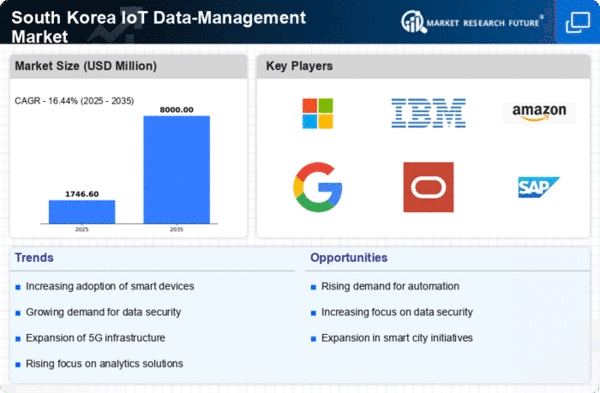Surge in IoT Device Penetration
The rapid proliferation of IoT devices in South Korea is a significant factor driving the IoT Data-Management Market. With millions of devices connected to the internet, the volume of data generated is unprecedented. Recent estimates suggest that the number of IoT devices in South Korea could reach 30 million by 2026. This surge necessitates effective data management strategies to handle the influx of information. Organizations are increasingly recognizing the need for sophisticated data management solutions to process, analyze, and derive insights from this data. As the IoT ecosystem expands, the demand for efficient data management systems will likely grow, indicating a promising outlook for the iot data-management market. The ability to manage and utilize data from a diverse array of devices will be crucial for businesses aiming to leverage IoT technologies.
Expansion of Smart City Initiatives
The development of smart city projects across South Korea is significantly influencing the IoT Data-Management Market. These initiatives aim to enhance urban living through the integration of IoT technologies, which generate vast amounts of data. The South Korean government has allocated approximately $2 billion for smart city projects, which include smart transportation, energy management, and public safety systems. This investment is expected to create a substantial demand for effective data management solutions to process and analyze the data generated by these systems. As cities become more interconnected, the need for robust data management frameworks will likely increase, thereby propelling the growth of the iot data-management market. The successful implementation of these projects hinges on the ability to manage and utilize data efficiently, underscoring the importance of this market.
Rising Demand for Real-Time Analytics
The increasing need for real-time data analytics is a pivotal driver in the IoT Data-Management Market. Organizations in South Korea are recognizing the value of immediate insights derived from IoT data, which can enhance decision-making processes. According to recent statistics, the market for real-time analytics is projected to grow at a CAGR of 25% over the next five years. This growth is largely attributed to the proliferation of connected devices and the subsequent surge in data generation. Companies are investing in advanced data management solutions to harness this data effectively, thereby driving the demand for sophisticated IoT data management systems. As businesses strive to remain competitive, the ability to analyze data in real-time is becoming increasingly essential, indicating a robust growth trajectory for the iot data-management market.
Growing Regulatory Compliance Requirements
The evolving landscape of regulatory compliance is a critical driver for the IoT Data-Management Market. In South Korea, businesses are increasingly required to adhere to stringent data protection regulations, such as the Personal Information Protection Act (PIPA). These regulations necessitate robust data management practices to ensure compliance and avoid hefty fines. As organizations strive to meet these legal requirements, they are investing in advanced data management solutions that can help them manage and protect sensitive information effectively. The compliance landscape is expected to become even more complex, which may further drive the demand for specialized IoT data management systems. Consequently, companies that can provide solutions that align with regulatory standards are likely to see increased opportunities in the market.
Increased Adoption of Cloud-Based Solutions
The shift towards cloud-based data management solutions is a notable trend impacting the IoT Data-Management Market. South Korean enterprises are increasingly adopting cloud technologies to store and process IoT data due to their scalability and cost-effectiveness. Recent reports indicate that the cloud services market in South Korea is expected to reach $10 billion by 2026, with a significant portion attributed to IoT applications. This transition allows organizations to manage large volumes of data without the need for extensive on-premises infrastructure. Furthermore, cloud solutions facilitate easier data sharing and collaboration among stakeholders, which is crucial for the effective management of IoT data. As more companies recognize the benefits of cloud computing, the demand for cloud-based IoT data management solutions is likely to surge, further driving the market.
















